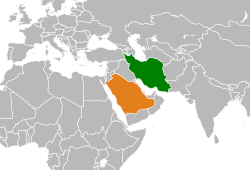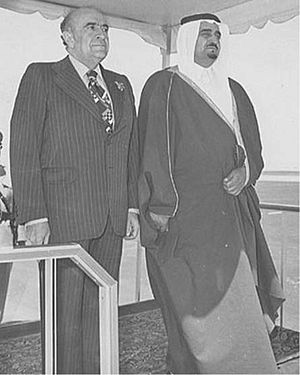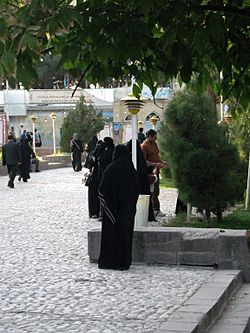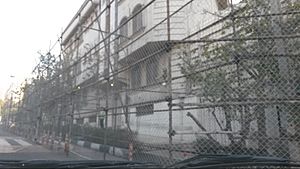Iran–Saudi Arabia relations facts for kids
 |
|
Iran |
Saudi Arabia |
|---|---|
Iran and Saudi Arabia are two very important countries in the Middle East. They have had a complicated relationship for a long time, sometimes friendly and sometimes tense. Their disagreements are often about who should be the main leader in the region, how much oil should be sold, and their relationships with countries like the United States.
For a while, they even stopped talking to each other officially, from 1987 to 1990, and again for seven years after a religious leader was executed in 2016. But in March 2023, with help from China, they decided to become friends again and restart their official connections.
Saudi Arabia is a kingdom, meaning it's ruled by a king. It has been close allies with the United States and the United Kingdom since after World War II. Iran used to be a kingdom too, but after the Iranian Revolution in 1979, it became an Islamic Republic. Before that, both countries were allies with Western nations during the Cold War against the Soviet Union. Saudi Arabia still has a strong partnership with the United States today.
Both Iran and Saudi Arabia sell a lot of oil and natural gas to other countries. They sometimes disagree on how much oil to sell and at what price. Saudi Arabia has huge oil reserves and fewer people, so it can think about the long-term future of oil prices. Iran, with more people and facing economic challenges, often needs higher oil prices right away.
In the Syrian civil war, Iran supported the Syrian government with money and military help. Saudi Arabia, on the other hand, gave a lot of help to the rebel groups fighting the government. Each country has accused the other of supporting harmful groups. They both want to be the most powerful country in their region, which causes a lot of competition.
Contents
- Why Have Iran and Saudi Arabia Had Tensions?
- A Look Back: History of Relations
- Religious Differences as a Source of Tension
- Saudi Arabia, Iran, and the United States
- International Efforts to Improve Relations
- See also
Why Have Iran and Saudi Arabia Had Tensions?
After the Iranian Revolution, Iran accused Saudi Arabia of being too close to the United States instead of focusing on Islamic values. Saudi Arabia worried that Iran wanted to spread its revolution and influence throughout the Persian Gulf region, especially in countries like Iraq and Syria. Saudi Arabia was also concerned about Iran's nuclear program.
The relationship between the two countries has gone up and down. Tensions grew after the Iranian Revolution and because of Iran's nuclear program. There have been many attempts to make things better. After the 1991 Gulf War, their relationship improved a lot. In 2007, Iran's President visited Saudi Arabia and was welcomed by the King, and the news even called them "brotherly nations."
However, the Syrian civil war (starting in 2011) caused new problems. Iran supported the Syrian government, while Saudi Arabia supported the rebels.
On January 3, 2016, Saudi Arabia's embassy in Tehran, Iran, was attacked by angry protesters after a Saudi religious leader, Nimr al-Nimr, was executed in Saudi Arabia. This execution caused protests in many countries. After the attack on its embassy, Saudi Arabia officially cut off all diplomatic ties with Iran and told all Iranian diplomats to leave the country.
Another reason for tension is their different types of government. Iran is an Islamic Republic led by a Supreme Leader, who is a religious scholar. The founder of the Iranian Revolution, Ayatollah Khomeini, did not believe in monarchies (rule by a king). Saudi Arabia, however, is a monarchy where the king is obeyed as long as he follows Islamic law. Saudi Arabia also has a minority of Shia Muslims who sometimes complain about unfair treatment.
A Look Back: History of Relations
Early Relations (1920s–1970s)

Saudi Arabia and Iran first started official diplomatic relations in 1929. But they broke off ties in 1944 after an Iranian pilgrim was executed in Saudi Arabia. They restarted connections in 1946.
Relations weren't very active until the 1960s, partly because of religious differences and Iran's recognition of Israel. In 1966, Saudi Arabia's King Faisal visited Iran to strengthen ties, and Iran's Shah (king) Mohammad Reza Pahlavi visited Saudi Arabia in return. They worked together to create international Islamic organizations.
In 1968, they signed an agreement about their borders. When the United Kingdom decided to leave the Persian Gulf region in the late 1960s, Iran and Saudi Arabia took on the main responsibility for keeping peace and safety there.
During the 1970s, Saudi Arabia worried about Iran's growing military power. They also disagreed about Iran taking control of some islands in 1971, which the United Arab Emirates also claimed. Despite these issues, the relationship between Iran and Saudi Arabia was quite friendly between 1968 and 1979.
Iranian Revolution (1979)
After the Iranian Revolution in 1979, led by Ruhollah Khomeini, Iran began to openly criticize the Saudi government. However, Saudi Arabia's King Khalid sent a message to Khomeini, hoping for closer relations based on "Islamic solidarity."
But after a deadly incident during the Hajj pilgrimage in Mecca in 1987, Khomeini strongly criticized Saudi Arabia. Because of this, Saudi Arabia and Iran ended their diplomatic relations until 1991.
Iran–Iraq War (1980s)
The religious differences between the two countries also played a role in the Iran–Iraq War. Saudi Arabia gave a lot of money (US$25 billion) to Saddam Hussein's government in Iraq. Saudi Arabia was worried that revolutionary Iran was a bigger threat to its own safety and the region's stability. Saudi Arabia also encouraged other Arab countries in the Persian Gulf to support Iraq financially. To help pay for the war, Saudi Arabia greatly increased its oil production, which made oil prices drop. This hurt Iran's ability to fund its war efforts.
During the war, Iran's planes flew into Saudi airspace and threatened Saudi Arabia and Kuwait if they didn't stop supporting Iraq. Even during these very tense times, Saudi Arabia did not completely break off diplomatic relations with Iran.
Air Battle in 1984
On June 5, 1984, two Iranian warplanes entered Saudi airspace. Saudi F-15 Eagles planes stopped them and shot down both Iranian planes.
1987 Hajj Incident
The relationship worsened further when clashes happened between Iranian pilgrims and Saudi security forces on July 31, 1987. About 400 pilgrims died, most of them Iranian. In response, angry protesters in Tehran attacked the Saudi embassy. Saudi Arabia then reduced the number of Iranian pilgrims allowed for Hajj and cut diplomatic ties with Iran on April 27, 1988. The Iranian government boycotted the Hajj for three years. Relations were not restored for three years after this event.
After the Iran–Iraq War
In October 1988, Saudi Arabia's King Fahd stopped all negative media campaigns against Iran and pushed Iraq to agree to a ceasefire. In 1989, Iran's President said that Iran and Saudi Arabia were having talks to improve their relations.
1990s: Improving Relations
Iraq Invades Kuwait (1990)
When Iraq invaded Kuwait in 1990, Iran criticized the invasion. This stance helped improve relations between Iran and the Gulf Cooperation Council (GCC), which includes Saudi Arabia. Both Iran and Saudi Arabia were against Iraq's invasion and supported UN actions against Iraq. Iran saw Iraq's actions as a serious threat. During this war, relations between Iran and Saudi Arabia improved a lot, and official ties were restored in 1991.
After this, there were quick visits between high-level officials. In April 1991, Iran's Foreign Minister visited Saudi Arabia to suggest an alliance for the security of the Persian Gulf. He argued that the GCC was too weak to prevent the invasion of Kuwait and that Iran should be included to strengthen regional stability.
The Hajj pilgrimage issue was also resolved. In 1991, Saudi Arabia allowed 115,000 Iranian pilgrims, much more than the previous quota. Iran also took steps to prevent large demonstrations by its pilgrims during Hajj.
1997 Islamic Conference Meeting
A meeting of the Organisation of Islamic Cooperation (OIC) in Iran in 1997 showed a change in how Arab countries viewed Iran. Saudi Arabia, which Iran had criticized before, also participated. Saudi Arabia's participation helped further improve relations. As a result, Saudi officials visited Iran, and Iran's President Mohammad Khatami visited Saudi Arabia in February 1998.
This was the first visit by an Iranian President to Saudi Arabia since the 1979 Revolution. They discussed economic issues, like oil production quotas. They also signed a cooperation agreement in May 1998 for economics, culture, and sports. The relationship continued to improve, and they signed a security agreement in April 2001.
In July 1999, Saudi Arabia's King Fahd encouraged other Persian Gulf countries to improve their relations with Iran, saying it was in everyone's best interest.
2000s: New Challenges
Yemen Conflict
Iran and Saudi Arabia support different sides in the Yemeni Civil War. Saudi Arabia supports the Yemeni government, while Iran supports the Houthi rebels. Iran has strongly criticized Saudi Arabia for its involvement in Yemen. In 2017, a Saudi Prince even called Iran's leader "new Hitler."
2010s: Rising Tensions and Attempts at Peace
Assassination Plot (2011)
In October 2011, the United States accused Iran of planning to assassinate the Saudi ambassador to the U.S.
Sanctions Against Iran
In 2012, when international sanctions were placed on Iran's oil sales, Saudi Arabia offered to make up for the lost oil supply. Iran warned against this.
Jeddah Airport Incident (2015)
In 2015, there were reports of two Iranian pilgrims being mistreated at a Saudi airport. This led to protests outside the Saudi embassy in Tehran. Iran temporarily stopped minor Hajj trips until Saudi Arabia promised to address the issue. Saudi authorities arrested the accused airport staff and said they would be punished.
Hajj Stampede (2015)
A deadly stampede during the Hajj pilgrimage in 2015 increased tensions because many Iranian pilgrims died. Iranian leaders blamed Saudi authorities for the disaster. A Saudi Prince suggested banning Iranians from Mecca to protect pilgrims.
Execution of Nimr al-Nimr (2016)
On January 2, 2016, 47 people were executed in Saudi Arabia, including the important Shia cleric Nimr al-Nimr. Protesters in Tehran responded by attacking and setting fire to the Saudi Embassy. Saudi Arabia then cut diplomatic ties with Iran.
Iranian Ban on Hajj (2016)
In September 2016, Iran stopped its citizens from going on the Hajj, claiming the 2015 incident was due to Saudi "incompetence." Saudi Arabia suggested Iran's move was political. However, in 2017, Saudi Arabia invited Iran to discuss arrangements for the Hajj, and Iran agreed to send a delegation.
2020s: Steps Towards Peace
Assassination of Qasem Soleimani (2020)
On January 3, 2020, a top Iranian general, Qasem Soleimani, was killed in a U.S. drone strike in Baghdad. He was reportedly in Baghdad to discuss Iran's response to a message from Saudi Arabia.
Talks and Restoration of Relations (2021-2023)
Since April 2021, Iraq has hosted five rounds of direct talks between Iran and Saudi Arabia. In December 2022, officials from both countries met in Jordan and said they were "open to more dialogue." Saudi Arabia also supported efforts to revive the Iran nuclear deal.
2023 Restoration of Relations
The two countries officially announced they would restart diplomatic relations on March 10, 2023. This happened after secret talks in Beijing, China, which helped make the deal. The agreement was signed by high-level security officials from both countries. They announced that their embassies would reopen within two months. This agreement was welcomed by many countries, including the United States, the United Nations, and Russia.
Under the deal, Iran and Saudi Arabia agreed to restart agreements about security, trade, and culture. They also promised to respect each other's independence and not interfere in each other's internal affairs.
Experts believe this agreement is very important. It could help calm down conflicts in Yemen, Syria, Iraq, Lebanon, and Bahrain. The fact that China helped make the deal might also mean that China's influence in the region is growing.
Envoys from both countries met in Beijing on April 6 to confirm their commitment. Iran's embassy in Riyadh reopened on June 6, 2023.
Religious Differences as a Source of Tension

Historically, the relationship between Iran and Saudi Arabia has often been uncertain. This is partly because most people in Saudi Arabia are Sunni Muslims, while most people in Iran are Shi'ite Muslims. Saudi Arabia is cautious about Iran's activities and influence in the Persian Gulf region.
For decades, leading religious scholars in both countries have disagreed on each other's religious beliefs. Tensions between these two major branches of Islam have increased over time, and this tension is not expected to be resolved quickly.
In 2016, Saudi Arabia's Grand Mufti (a top religious authority) was replaced for giving the Hajj sermon. He had given the sermon every year since 1981 but was replaced after saying that Iran's Shi'ite leaders "are not Muslims."
Saudi Arabia, Iran, and the United States
Saudi Arabia and the United States have been close allies for over sixty years. Saudi Arabia sees itself as a strong partner of the U.S. in international conflicts.
From 1953 to 1979, Iran, under its Shah, was also an ally of the United States.
Even though Saudi Arabia is close to the U.S., it has sometimes kept its distance from American foreign policy, especially regarding Iran. Saudi Arabia recognized that Iran was a powerful country that could cause problems in the region. So, Saudi Arabia's safety often required good relations with its neighbors, including Iran.
In 2007, Iran's President was the first Iranian leader to attend the annual summit of the Gulf Cooperation Council (GCC), a group partly created to limit Iran's influence. This visit showed a possible change in relations.
In 2013, Saudi Arabia's Ambassador to Britain wrote an article criticizing Western allies for not taking strong enough action against Syria and Iran. He said this was making the Middle East unstable and forcing Saudi Arabia to be more active in international affairs.
International Efforts to Improve Relations
Many countries have tried to help Iran and Saudi Arabia improve their relations, especially after the crisis that started with the execution of Sheikh Nimr in 2016. In 2016, Pakistan's Prime Minister and army chief visited both Riyadh and Tehran to help.
Since April 2019, Iraq has offered to host peace talks to help Saudi Arabia and Iran resolve their issues. These talks began in 2021, but progress was slow. However, Iran suspended the peace talks in March 2022 without giving a reason.
On May 26, 2022, Iran's foreign minister stated that the country had made "minimal but good progress" in its relations with Saudi Arabia.
Reopening Embassies
Iran and Saudi Arabia agreed to restart relations on March 10, 2023, after a diplomatic deal was made with China's help. The deal followed several days of secret talks in Beijing. After the agreement, Iran's President Ebrahim Raisi accepted an invitation from Saudi Arabia's King Salman to visit the kingdom. The deal was also helped by Iran agreeing to stop supplying weapons to Houthi rebels in Yemen and follow a UN arms ban.
On April 8, 2023, Saudi officials arrived in Iran to prepare for reopening their embassies. Iran's foreign minister announced on April 29, 2023, that the embassies would reopen within days. Iran's embassy in Riyadh reopened on June 6. Saudi Arabia is also preparing to open its embassy in Iran.
See also
 In Spanish: Relaciones Arabia Saudita-Irán para niños
In Spanish: Relaciones Arabia Saudita-Irán para niños
- Foreign relations of Iran
- Foreign relations of Saudi Arabia
- Iran–Saudi Arabia football rivalry
- Arab League–Iran relations
 | Kyle Baker |
 | Joseph Yoakum |
 | Laura Wheeler Waring |
 | Henry Ossawa Tanner |


